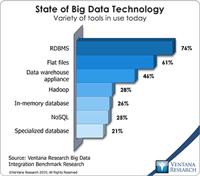The Oracle Analytics Summit 2019 was the inaugural user event for Oracle Analytics customers, and they also broadcast the video for thousands of others. You can watch the keynote at https://www.youtube.com/watch?v=eY0IPNqzsy4. Executives talked about some big organizational changes, including Bruno Aziza joining last year to lead the analytics organization. This event marked a transition and "a new beginning" for the Oracle Analytics portfolio, as the company announced three new analytics...
Read More
Topics:
Big Data,
Data Science,
Oracle Cloud,
Oracle
It’s part of my job to cover the ecosystem of Hadoop, the open source big data technology, but sometimes it makes my head spin. If this is not your primary job, how can you possibly keep up? I hope that a discussion of what I’ve found to be most important will help those who don’t have the time and energy to devote to this wide-ranging topic.
Read More
Topics:
Big Data,
Microsoft,
Teradata,
Business Analytics,
Business Intelligence,
IBM,
Information Management,
Operational Intelligence,
Oracle,
HPE,
ODPI,
Strata+Hadoop
Oracle made several announcements at its recent Open World event demonstrating its strengths in the business computing market but also that it is standing on the shoulders of giants. The company has developed the expertise, processes and market share to scale out the ideas and innovations of others. Don’t get me wrong: That statement is not an indictment. Large organizations often have challenges with innovation. They are not as nimble as their smaller competitors. On the other hand, small...
Read More
Topics:
Big Data,
Sales Performance,
Social Media,
Supply Chain Performance,
Business Analytics,
Business Intelligence,
Business Performance,
Cloud Computing,
Customer & Contact Center,
Financial Performance,
NoSQL,
Oracle,
Workforce Performance,
Strata+Hadoop,
Digital Technology
Oracle kicked off its Open World 2011 conference with the announcement ofExalytics, a new data warehouse appliance specifically for business intelligence (BI). Three years ago when Oracle introduced the Exadata product line it was based on hardware from Hewlett-Packard. Since then it has acquired Sun Microsystems and replaced the HP components in Exadata, assuming complete control over the hardware and software included in the appliance. Oracle also introduced two other appliance products:...
Read More
Topics:
Sales Performance,
Supply Chain Performance,
Business Analytics,
Business Intelligence,
Business Performance,
Exalytics,
Financial Performance,
Oracle,
Visualization,
Workforce Performance,
Digital Technology
In various forms, business intelligence (BI) – as queries, reporting, dashboards and online analytical processing (OLAP) – is being used increasingly widely. And as basic BI capabilities spread to more organizations, innovative ones increasingly are exploring how to take advantage of the next step in the strategic use of BI: predictive analytics. The trend in Web searches for the phrase “predictive analytics” gives one indication of the rise in interest in this area. From 2004 through 2008, the...
Read More
Topics:
Predictive Analytics,
Predixion,
R,
Revolution Analtyics,
Sales,
Sales Performance,
SAS,
Social Media,
Supply Chain Performance,
Analytics,
Business Analytics,
Business Collaboration,
Business Intelligence,
Business Mobility,
Business Performance,
Business Technology,
CIO,
Cloud Computing,
Customer & Contact Center,
Financial Performance,
IBM SPSS,
Information Builders,
Information Technology,
KXEN,
Netezza,
Oracle,
Workforce Performance
Read More
Topics:
Data Warehousing,
Microsoft,
RDBMS,
SAS,
Teradata,
Analytics,
Business Intelligence,
Cloud Computing,
Data Management,
HP,
IBM,
Information Management,
Oracle,
IT Performance Management (ITPM)












